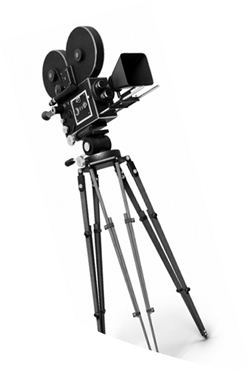Kino (31 page)
Authors: Jürgen Fauth

“And good riddance,” Penny said. “Come on, Mina, it's getting cold.”
The sun was indeed setting. Mina transferred Penny back into the wheelchair. From his backpack, Jupp produced a black metal box and a small silver chain with a key.
“This key opens the film vault in Frankfurt,” he said, “and this is a hard drive with digital transfers of the movies. Everything we have is on here. I want you to have it. I can't be alone with them any longer. It's what Kino would have wanted.”
Mina took the key and the hard drive. “
Tulpendiebe
and
Twenty-Twelve
are on here?”
“What's left of it, yesâas well as his other films.”
“Oh.” Mina didn't know what to say. All of this running around, and now she just got Kino's movies handed to her? All she could manage was “Thank you.”
“Thank you?” Penny hissed. “Girl, have you not learned a single thing? Don't you understand Kino will cause you nothing but grief and pain?”
“Oma,” Mina said. “Don't you think they've already done their damage? I lost Sam over these movies. The least I can do now is watch them, no?”
Penny turned away from both of them, as far as her wheelchair would permit.
“I'll trade you one cranky woman,” Mina said, letting go of the handles. “Take her back upstairs, will you?”
Penny protested. “Don't leave me alone with this liar!”
“Come on,” Mina said. “I bet you like him a lot better than your other sonâthe one who hasn't called you once since you've woken up?”
Penny spit and gave Jupp a sideways glance. “Do you have any more Asbach?”
Mina squeezed the hard drive into her bag and gave Jupp a hug. He reeked of cognac. “If you like, come by the house for dinner tonight. Chester's cooking.”
Jupp gave her a grateful nod. Mina watched as her uncle wheeled his mother away.
Chapter 20
Mina lost no time hooking up the portable hard drive. Neatly labeled folders contained digital masters of all of Kino's films, the Weimar and Third Reich ones as well as
Twenty-Twelve
, and Mina resolved to watch them in chronological order, starting with
Tulpendiebe
.
This time, she saw the film differently. Parts that had seemed ridiculous and slow to her were now imbued with accidental poetry and optimism. There was love in the way the camera gazed on sick Lilly's pallid face, eyes wide with innocence of everything they were yet to see. Mina sat up all night in the upstairs study, at Kino's wooden desk, looking out over the pulsating grid of Los Angeles's lights. Hollywood was out there, but she had something even better.
Mina watched all of Kino's Weimar output that same night, transported to Jupiter, the jolly vineyards of the Rheingau, and
Land der Gnade's
utopian jungle village. Every movie captured Mina's imagination more than the one before, and Penny, so young and beautiful and talented, was riveting. That she never acted again and her performances went unseen seemed, to Mina, every bit as tragic as Kino's thwarted ambition.
The next day, Chester went to visit Penny, and Jupp, who'd spent the night in one of the spare bedrooms, joined him, apprehensive and hung over. Mina returned to the study to watch the rest of her grandfather's movies.
Luftschiffwalzer
and the other operettas struck her as limp, forced, with a busy surface that pretended to entertain but betrayed a terrible sadness underneath. For all their countryside picnics and glittering balls, the actors looked as if they were suffocating in their evening gowns and Prussian uniforms.
Mina was glad when she finally made it through
Tanz in den Wolken,
the last of the Third Reich films, and opened the folder containing
Twenty-Twelve.
Unlike the other films, there wasn't one large master file, but a numbered collection of shorter clips that Jupp and Dr. Hanno had salvaged from Botha's reels, a few of them five or six minutes long, but most around the minute mark and some even shorter. Instead of cueing up the fragments in order, she opened them at random, shuffling through them, grasped by the urgent need to know what, exactly, was left of Kino's last movie.
She recognized a few moments from the studio release version of
Pirates
, sometimes with added lines of dialogue or shot from a different angle, cut in a more jarring, haphazard way that made it seem as if they were part of a different narrative altogether. Other scenes, from the back lot set and filmed on location in Mexico, were entirely new to Mina. There were bits that belonged to a subplot about a mutiny, and there was talk about an ancient prophecy. Many of the scenes had a raw beauty that Mina hadn't seen in the cheesy material that was used for the recut release version. Some of them appeared to be outtakes. Mina also found scanned PDF files of a modified screenplay draft. She recognized her grandfather's jagged scrawl on the marked-up pages.
But the more Mina clicked, the more she realized that she had less than half of the film, in discolored pieces, jumbled and scattered. The thought that she would never get to see
Twenty-Twelve
whole made her feel defeated.
What was it the studios had been so afraid of? Was it something that had been lost, cut, rotted away in Botha's attic? Mina didn't expect to find out, and she began to understand what Kino had said about his films: they were beyond anyone's control.
What interested her now was only the film itself, the images on the screen in front of her. She couldn't get enough of them. She was thrilled to discover footage of the set fire Marty had described, the riot in Mulberry Cove, slightly overexposed images of Darius Silko and his bride Bonnie riding in a carriage, men in robes praying and chanting, and news footage of President Kennedy, giving Castro his ultimatum.
Mina also found a short clip of a man in his sixties, standing in the surf at night, illuminated by a row of tiki torches, the waves lapping at his ankles. He was wearing torn pants and a frilly purple blouse, his face covered in stubble and his gray hair long and dirty. He was waving a cutlass and speaking directly into the camera. One of his legs was covered by a thigh-high leather boot; the other was a simple peg leg, so thin that it had to be real. With a jolt, Mina realized that she was looking at Kino.
With an unmistakable German accent, he declared: “On the eve of Mulberry Feast, the ghost of Grapefruit Silko, legendary captain of the Gaia,
Schrecken der Sieben Weltmeere
, dead for a hundred years, appears in the waves to convey a message of hope and love to his heirs.”
Mina leaned in closer. Kino rubbed his face and scratched his stubbly beard. He was hamming it up. “The volcano that looms over Mulberry Island leads down to the absolute unchanging core of the world,” he said. “Remember: no matter what, Mulberry Island remains. Anything is still possible.” Someone, possibly Marty, mumbled something off-camera, and Kino waved them off angrily. “Cut!” he shouted, and the screen went black.
Mina rewound the clip and hit play again. She stared at her deranged grandfather, in awe of what he had tried to do.

Word from the doctors was that Penny would be able to return home soon. Chester and Jupp were becoming unlikely friends. They claimed the back patio for after-dinner cognac and told stories of their respective livesâwhich was fine with Mina, who stayed up late every night, rereading Kino's journal and rewatching his films. She began toying with video editing software and learned how to burn the files onto DVDs. The films looked terrific on the large screen downstairs. She researched video codecs and file sharing protocols and downloaded open source transcoding software. After some false starts and wasted hours, she managed to compress Jupp's digital masters into high-quality DivX files and seeded them on thepiratebay.com, one of the hub BitTorrent trackers operating out of Sweden.
When Mina hit upload on the last file, she poured herself a Dewar's and watched the progress bar creep upwards as the first leechers jumped on the torrent and began downloading Kino's movies. Katz and his goons would be up in armsâand if Jupp and Marty had been right, even the government would take notice. It was risky, but once the movies were out there, nobody could ever lock them away again.
Mina had become a pirate.
The next day, a film critic in London blogged about the lost German films that had appeared on the Swedish tracker, and a number of movie sites picked up on the story, reblogged, aggregated, and propagated it. Downloads surged. Full-length versions became available for streaming and in mobile formats. When the sites hosting the movies were threatened by cease and desist letters, the torrents disappeared briefly, only to pop up again on other trackers.
Initially,
Jagd zu den Sternen
and
Tulpendiebe
were the most popular. A meme developed around the sailor's eating of the tulips, and film students in Chicago reenacted the scene on YouTube. Mash-up clips appeared and were, in turn, blogged about. But over time, more and more people kept returning to the zipped archive containing the surviving fragments of
Twenty-Twelve.
An online community began clustering around the film's husk, recutting scenes according to their own theories, remixing the footage with found bits and reenactments that were meant to fill narrative holes, redubbing dialogue that didn't fit their version, voting on their favorites, and doing it all over again. Most of the fan-made videos lacked finesse, some were filmed in backyards, basements, and dorm rooms, some were animated, and some were brilliant.
Twenty-Twelve
had escaped into the wild, a constantly procreating mutant film that belonged to everyone.
Mina understood that her grandfather's final film had always been an invitation to be altered, a film that chafed at all constraints and was right at home in a distributed network where it could grow into an ecology of stories, a coral reef of ideas that multiplied and morphed into a common repository of dreams and desires until, perhaps, one day they might align perfectlyâand then, Mina wondered, what would we see?
Every night, Mina sat alone in Kino's study, assembling the images in her own way, combining the snippets on the hard drive with footage from the Internet. She found pleasure in the structuring, teasing out shifting meanings and new narrative possibilities, searching for the hidden rhythm that governed the events on screen. She knew that if she worked hard enough and put the right scenes in just the right order, she would arrive somewhere, and
Twenty-Twelve
would find its ending. Sometimes, near the edges of the frame, Mina thought she caught sideways glimpses of Sam.

Unlike filmmaking, writing is a solitary pursuit or so it seems. As it turns out, the list of people who helped me write this book is long. For their faith and generous support, their hospitality, and their creative and editorial input, I'd like to thank: Melissa Johnson, Jason Rozger, Lesley and Harvey Weinberg, Jocelyn Russell and Dan Alford, John Schmit, the Ora Lerman Charitable Trust, Frederick Barthelme, John Minichillo, Dan Cafaro, Lacey Dunham, Libby Kuzma, Jamie Keenan, Ann and Ira Dermansky, Sebastian Engel, Tanja Fauth-Engel, Elfi Fauth, Uschi und Günther Fauth, the Fictionaut community, and Marcy Dermansky.

